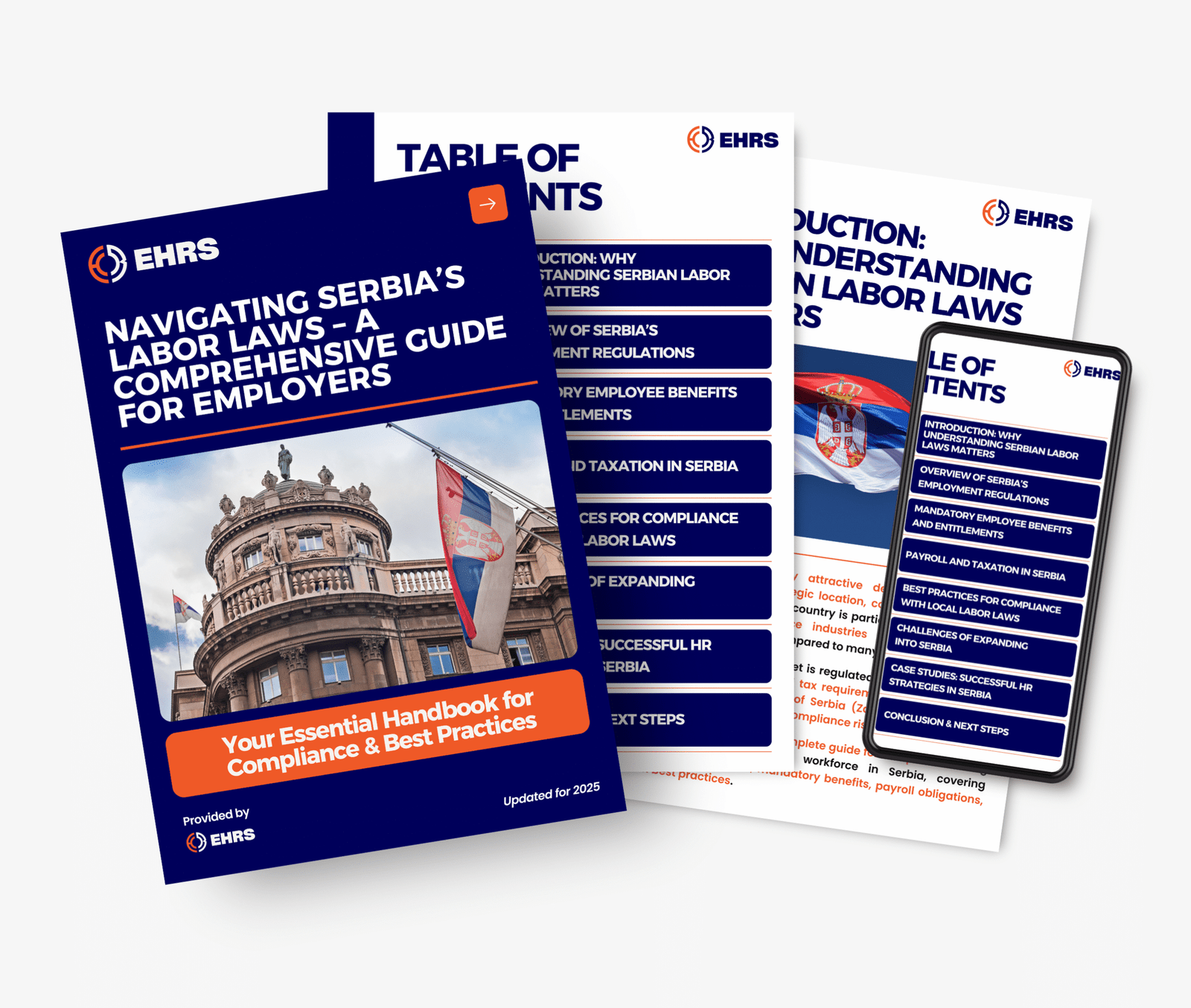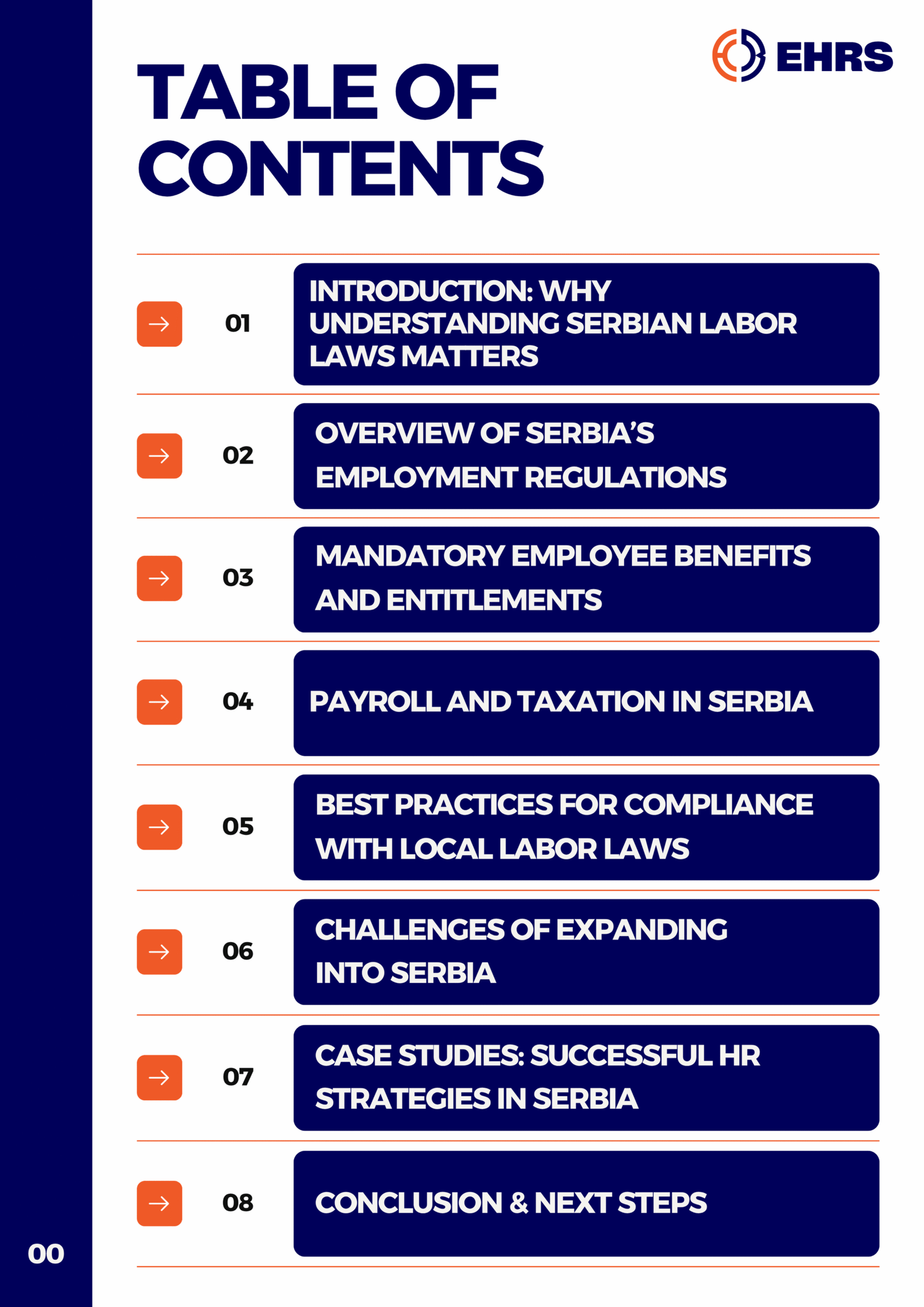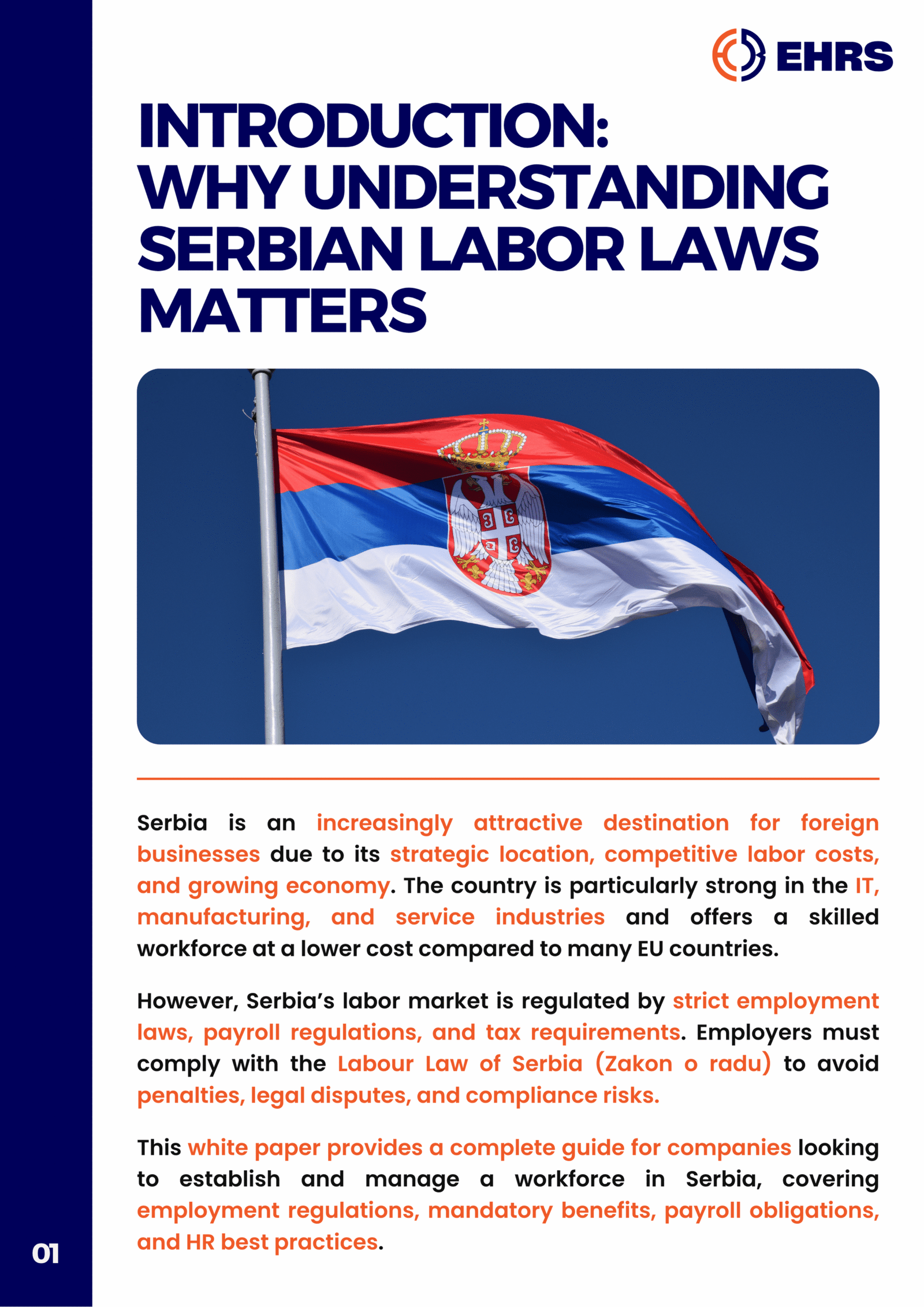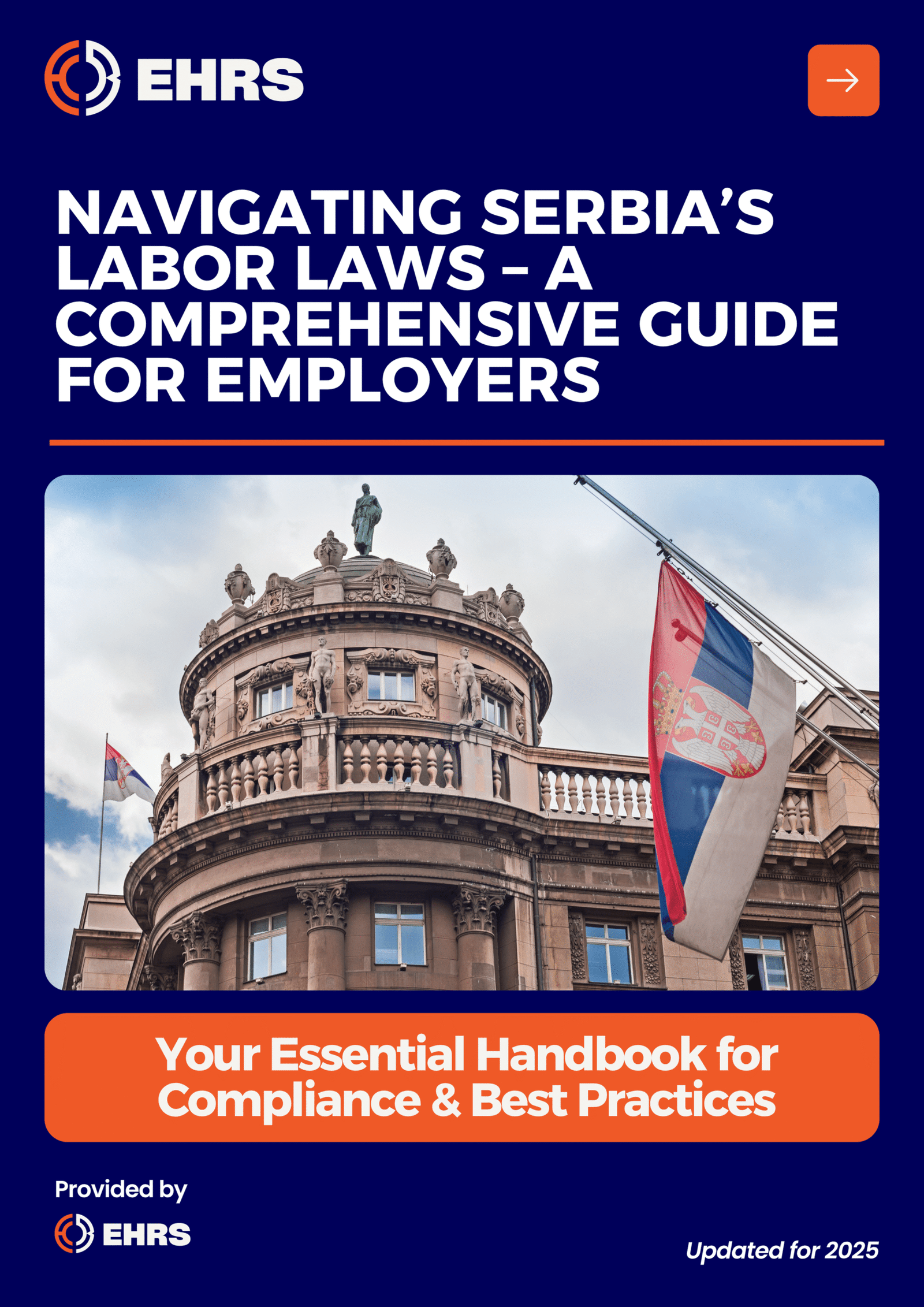SERBIA
List of countries
HR Services for Serbia
Europe HR Solutions delivers professional HR services for Serbia, supporting international businesses with payroll, compliance, recruitment, and employee administration. We simplify HR management under Serbian labor law so you can focus on building and scaling your business.
According to the U.S. Department of State, Serbia remains one of the most dynamic and accessible investment destinations in Southeast Europe. With a well-educated workforce, competitive labor costs, and growing infrastructure, Serbia has attracted increasing levels of U.S. and international investment across sectors such as IT, automotive, agriculture, and manufacturing. While not an EU member yet, Serbia has signed a Stabilization and Association Agreement with the EU and continues to align many of its legal and regulatory frameworks with EU standards, positioning itself as a key gateway to both Western and Eastern European markets.
However, HR operations in Serbia can present challenges for U.S. and UK companies unfamiliar with its labor legislation, payroll tax requirements, and administrative processes. Employment contracts must comply with Serbia’s Labor Law, including clearly defined provisions for salary, probation, termination, and working hours. Employers must also adhere to mandatory social security contributions and local reporting obligations. Without local expertise, navigating Serbian bureaucracy and employment compliance can lead to delays or legal risks. By outsourcing HR to a trusted local partner like EHRS, companies can accelerate market entry and ensure employment contracts, payroll, and personnel records are fully compliant with Serbian law—while also aligning with evolving EU labor standards and best practices.
ALL YOU NEED TO KNOW ABOUT
HR OUTSOURCING IN SERBIA
SERBIAN EMPLOYMENT
REGULATIONS TO KNOW
THE BENEFITS OF
EXPANSION IN SERBIA
THE CHALLENGES OF
EXPANSION IN SERBIA

Check our free HR guide to help you quickly improve your HR in Serbia
FAQ for Serbia
Learn more about Serbia
Free Download
Request your free guide and receive it immediately

All You Need to Know About Outsourcing
Your HR in Serbia with EHRS
Comprehensive HR Outsourcing Support
EHRS provides full-service HR services for Serbia, managing employment contracts, payroll, onboarding, leave administration, and legal compliance. Our local team ensures your HR operations are built on solid regulatory foundations, allowing you to scale confidently in the Western Balkans.
Expert Navigation of Serbian Labor Law
Serbia’s labor laws cover strict rules around contract formats, termination procedures, notice periods, and social contributions. EHRS helps you comply with all labor code requirements while keeping your operations aligned with international standards and Serbia’s gradual EU harmonization efforts.
Scalable and Efficient HR Solutions
Whether you’re setting up in Belgrade, Novi Sad, or beyond, EHRS offers flexible HR solutions tailored to your business size and growth strategy. We help startups, regional hubs, and global companies simplify their HR compliance from day one.
Serbian Employment Regulations to Know
Employment Contracts
All employees must have written employment contracts signed before work begins. These contracts must clearly define job duties, salary, probation (if applicable), working hours, and termination clauses. Contracts must be submitted to the Central Registry of Compulsory Social Insurance (CROSO). Our HR services for Serbia ensure every employment agreement is compliant, transparent, and properly filed.
Working Hours & Paid Leave
The standard workweek in Serbia is 40 hours. Employees are entitled to a minimum of 20 days of paid annual leave, in addition to public holidays. Overtime, rest periods, and leave entitlements are regulated under the Serbian Labor Law.
Social Contributions & Payroll Reporting
Employers must register employees with tax and social insurance authorities and make contributions covering pensions, health insurance, and unemployment benefits. Monthly payroll reports must be submitted through Serbia’s e-government portals.
The Benefits of Expansion in Serbia
Strategic Access to EU and Balkan Markets
Although not an EU member, Serbia maintains strong trade agreements with the EU, CEFTA countries, and others—making it a valuable location for regional expansion and nearshoring.
Competitive Labor Costs & Skilled Workforce
Serbia offers a cost-effective and well-educated workforce, especially in IT, engineering, manufacturing, and business services. English proficiency is high among younger professionals and urban talent pools.
Investment Incentives and Growth Sectors
Serbia provides government incentives for job creation and R&D, particularly in tech, industrial zones, and green energy sectors. Its improving infrastructure and digital ecosystem make it increasingly attractive to foreign investors.
The Challenges of Expansion in Serbia
Complex Legal Framework & Labor Protections
While Serbia is making progress toward EU alignment, labor law enforcement and contract rules require close attention. Terminations, severance, and fixed-term rules can be complex without local expertise.
Bureaucracy and Document Handling
Administrative processes—such as employee registrations, payroll declarations, and labor filings—can be slow or paper-heavy. Delays are common without local navigation and digital familiarity.
Serbian Language Requirements
All employment contracts and official documentation must be in Serbian. Legal translation and cultural localization are essential to avoid compliance issues and employee misunderstandings.
Talk to an HR specialist about payroll, compliance, and audits today.
Expand into Serbia with confidence.
Most Asked Questions
About Serbia
Why do I need a written employment contract in Serbia? Aren’t verbal agreements valid?
Serbian labor law mandates written employment contracts for all employees, outlining key terms like job duties, salary, and working hours. Without one, your business could face fines or disputes.
Why It’s Risk-Free: We draft fully compliant contracts that protect your business and provide clear expectations for employees.
Do I really need to track working hours in Serbia? Isn’t flexibility more important?
Serbian labor law requires employers to track working hours and ensure compliance with the standard 40-hour workweek. Overtime must be documented and compensated.
Why It’s Risk-Free: We help implement efficient time-tracking systems, ensuring compliance while supporting workplace flexibility.
How much annual leave do I need to provide? Isn’t the statutory minimum sufficient?
Employees in Serbia are entitled to a minimum of 20 working days of annual leave, with additional leave for specific roles or tenure. Offering only the minimum might affect retention.
Why It’s Risk-Free: We create competitive leave policies that comply with Serbian labor laws while supporting employee satisfaction and retention.
Parental leave in Serbia seems long. How can I maintain productivity during employee absences?
Mothers are entitled to 365 days of fully paid maternity leave, with additional leave available for fathers. Proper planning and temporary replacements ensure business continuity.
Why It’s Risk-Free: We assist with workforce planning and compliance, helping you manage employee absences while supporting operational stability.
Are collective agreements (CAs) mandatory in Serbia? Can’t I create my own policies?
CAs are not mandatory unless your business operates in an industry governed by one. However, ignoring applicable agreements can lead to disputes or penalties.
Why It’s Risk-Free: We assess whether CAs apply to your business and align your policies accordingly to avoid conflicts.
How do payroll taxes work in Serbia? What happens if I make a mistake?
Employers must deduct income tax, social security contributions, and other payments from salaries. Errors can result in penalties or audits from Serbian authorities.
Why It’s Risk-Free: We manage payroll compliance, ensuring accurate deductions and timely filings with Serbian authorities.
Do I need to focus on health and safety in Serbia? Isn’t this just common sense?
Serbian law mandates health and safety measures, including risk assessments and employee training. Non-compliance can result in fines or workplace accidents.
Why It’s Risk-Free: We develop health and safety policies and conduct risk assessments, ensuring compliance and protecting your workforce.
Is compliance worth the cost? Won’t it just increase my overheads?
The cost of non-compliance—fines, lawsuits, and employee turnover—far outweighs the investment in proactive compliance. It also builds trust and operational stability.
Why It’s Risk-Free: We streamline compliance processes, saving you time and money while ensuring your business operates legally and efficiently.
Are probation periods necessary? Can’t I just terminate employees who don’t perform?
Probation periods in Serbia, limited to 6 months, allow employers to evaluate employees and terminate more easily if they don’t meet expectations. Without a probation clause, terminations are subject to stricter rules.
Why It’s Risk-Free: We structure compliant probation agreements, giving you flexibility while reducing legal risks.
Is overtime pay mandatory? Can’t I just offer extra time off instead?
Overtime in Serbia must be compensated at a 26% premium or substituted with time off if agreed upon. Mismanaging overtime can lead to disputes or penalties.
Why It’s Risk-Free: We ensure your overtime policies align with Serbian labor laws, avoiding costly disputes and ensuring fairness.
Do I need to pay employees during sick leave? Isn’t this handled by social insurance?
Employers must pay 65% of the employee’s average salary for the first 30 days of sick leave. Beyond that, payments are covered by social security, but employers manage the process.
Why It’s Risk-Free: We handle sick leave documentation and compliance, reducing administrative burdens while ensuring accuracy.
Termination laws in Serbia sound restrictive. What if I need to reduce staff quickly?
Terminations in Serbia must comply with labor law, requiring valid reasons, adherence to notice periods, and severance payments in some cases. Non-compliance can lead to legal claims.
Why It’s Risk-Free: We guide you through lawful termination processes, protecting your business from disputes while ensuring fairness.
Are pensions mandatory in Serbia? Isn’t salary enough to retain employees?
Employers are required to contribute to Serbia’s social security system, which includes pensions. Offering additional benefits can improve employee loyalty and competitiveness.
Why It’s Risk-Free: We ensure compliance with pension contributions and help design attractive benefit packages to retain top talent.
Can I hire non-EU workers in Serbia? Isn’t the process too complicated?
Hiring non-EU workers requires a work permit and residence permit, with employers needing to demonstrate the role cannot be filled locally. Delays or errors can affect hiring timelines.
Why It’s Risk-Free: We handle the permit application process, ensuring compliance and a smooth onboarding experience for international hires.
What happens if I fail a compliance audit in Serbia? Could it disrupt my business?
Non-compliance with Serbian labor laws can lead to fines, legal claims, or operational restrictions. Audits often focus on payroll, contracts, and workplace safety.
Why It’s Risk-Free: We proactively review your policies and practices, ensuring full compliance and audit readiness.



